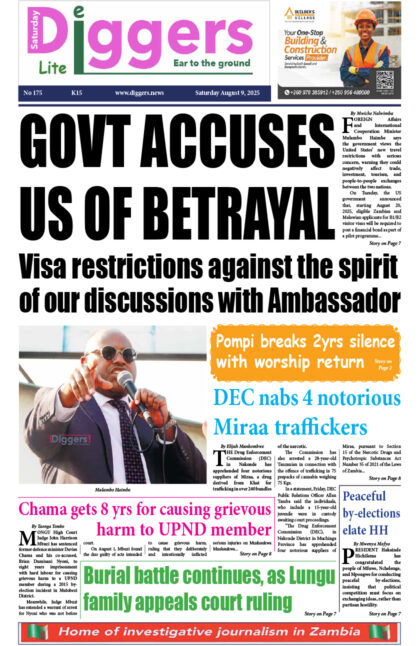THE Ministry of Health has revealed that there was a typing error by Zambia’s embassy in Ethiopia which showed that this country received 200,000 COVID-19 test kits and one million face masks from the Jack Ma foundation when only 20,000 test kits and 100,000 face masks were donated.
Speaking when he made a submission before the Parliamentary Public Accounts Committee, MoH permanent secretary in charge of technical services Dr Kennedy Malama said the letter, cited in the interim report on the audit of utilisation of COVID-19 Resources as at July 31, 2020, from the Embassy in Ethiopia had an error and had since been corrected.
“Chairperson, the observation by the auditors is noted. I wish to report that our engagement with the Embassy revealed that there were typos in the quantities quoted in the letter dated 24th March, 2020 from the Zambian Embassy in Ethiopia. The Embassy had reported that Zambia had been allocated among others 200,000 COVID-19 test kits and one million face masks. However, the correct allocation were 20,000 and 100,000 test kits and face masks respectively. Correspondence from the Zambian Embassy in Ethiopia acknowledging that the amounts announced by them was not what was fixed in Zambia and further requested that the Zambian government acknowledges only the items which were received,” Dr Malama said.
And in relation to the Trade Kings donation, Dr Malama said the K28 million was not cash but broken down in form of goods and services procured by the company.
“As indicated in the audit report, no funds were received by Trade Kings Group by the ministry as the donation of K28 million was not in monetary form but in form of goods and services procured directly by them, that is Trade Kings,” said Dr Malama.
Meanwhile, in the report, the Auditor General had observed that MoH had not been utilising either e-GP or IFMIS in the administration of procurements and payments during this period, therefore, all procurements and payments were done manually, outside the system.
Further, the Auditor General reported that contrary to Ministry of Finance Treasury and Financial Management Circular No.3, the Ministry of Health received and utilised K504,000 after the issuance of the Circular No.3 through an account (First Capital Bank Account) not authorised by Ministry of Finance.
Following up on this, Chavuma UPND member of parliament Victor Lumayi asked Dr Malama to explain why the Ministry did not use the systems put in place such as IFMIS to transact.
And in response, MoH director of finance Daniel Kalango said; “The IFMIS could not be used for transactions that were conducted outside the TSA which is the treasury single account that is held at Ministry of Finance. IFMIS, chair, was used at the time we were making these transfers to the commercial bank which is used for emergency responses. So in the emergency responses, it was not possible to use it because it was outside the system. I submit Chair.”
And Milenge PF member of parliament Mwansa Mbulakulima wondered why the electronic government procurement tool was not used during the response period thereby leaving room for the misuse of the funds.
In response, MoH head of procurement Wilson Lungu said the Ministry applied for a no objection to use the simplified bidding irrespective of thresholds.
“Chair, in as far as e-GP, allow us to report that in 2016, we were one of the pilot sites at which e-GP was being tested. We have been using e-GP from 2016 Chairperson. However, in so far as the COVID-19 response is concerned, we did apply for no objection to use simplified bidding irrespective of threshold. The configuration of e-GP Chairperson links procurement methods to thresholds and with the collapsing of those procurement methods namely: open a national bidding and open international biding into simplified bidding, the challenge that we had was to apply electronic procurement whose configuration links to thresholds, to simplified requests which had no threshold,” said Lungu.
“Chairperson, allow me to indicate that the legal framework for procurement has undergone reform and we are thankful that as at 2020 which was last year, the public procurement act 2020 was passed and as we speak, the associated regulations are being worked on from the consultations that we did with the regulators ZPPA so that when the commencement order is signed for the Act, we then will be able to move forward with the regulatory framework that speaks to electronic procurement among other provisions.”
























